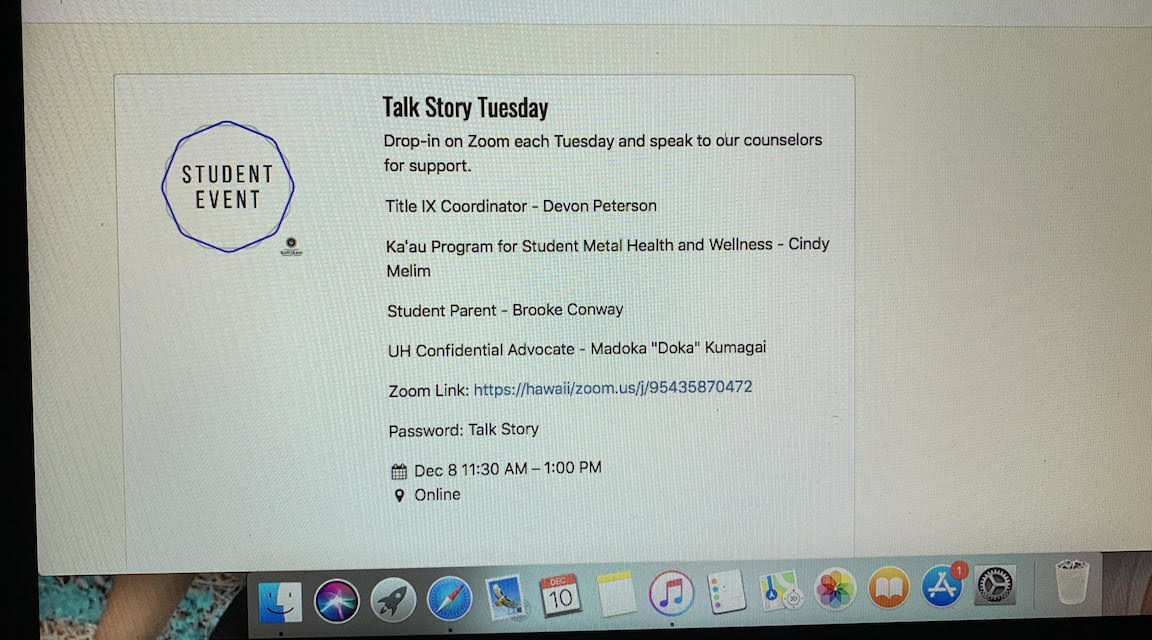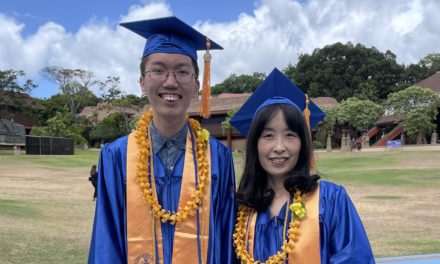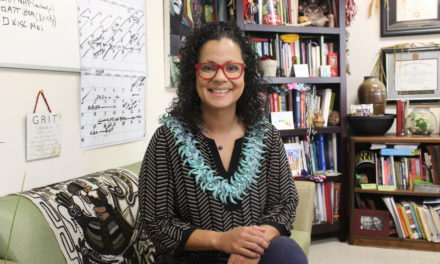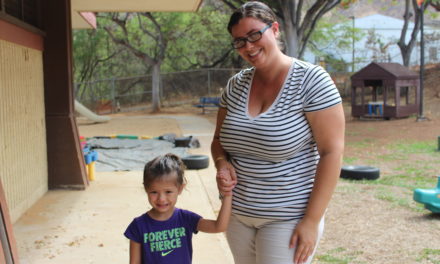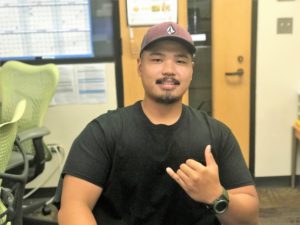By Estefania Magdalena | Staff Writer
The changes that the pandemic brought to the lives of students, and the fatigue of going through the final stage of 2020 can cause stress or anxiety. In case students feel overwhelmed, they can attend Talk Story Tuesday, a space in which they can talk about any problem that they are going through, whether related to school or personal.
Before the pandemic occurred, Talk Story Tuesday hosted by Devon Peterson, Brooke Conway, and Cindy Melim was taking place in the ʻIliahi building’s offices of the KapCC campus, but with the arrival of the coronavirus it had to start being done online. This brought difficult consequences to connect with students, who used to approached on campus when they saw a flyer or the coordinators sitting in some area of the campus smiling to them.
Devon Peterson, the Title IX coordination at KapCC, helps students who are suffering or have suffered from any of the areas that she covers, regardless of whether it is a situation occurring in the present, or some event from the past that is affecting a student’s schooling. The Zoom meetings are held every Tuesday from 11 a.m. to 1 p.m. through this link. Students do not need to register before attending and the password to access the room is “Talk Story”. The last Talk Story Tuesday meeting of the semester was held on December 8, but they will begin again when the spring semester starts.
“The idea was because Title IX deals with subjects that often times people don’t feel comfortable talking about… so the idea was to kind of trying to erase the stigma associated with it and make it more visible,” Peterson said. “So it began with us initially when we were all on campus…we would meet on Tuesdays at different locations throughout the campus to just be more accessible to students and the faculty, and just be a low-key way for people to come and talk to us.”
Brooke Conway, a student parents program counselor, said that the confidential counselors that work in Talk Story Tuesday give a safe space where students can attend to and talk about whatever is affecting them. Having a confidential space is a resource for students to get basic support, and get connected to other on campus or off campus resources in order to get further legal, medical, or mental health support depending on the situation, like the Domestic Violence Center or the Sex Abuse Center.
“We encourage students and everyone going through it to really take care of themselves and give themselves space and grace during these times because the pandemic has brought a huge demands of changes to all of our lives, converting all of our lives online,” Conway said. “A lot of people report feeling isolated, having more depression or anxiety, so self care is really important, and just finding those ways that help you breathe, help you feel a little bit better.”
During the meetings students can be put in breakout rooms for one-on-one sessions with the counselor that they prefer, but Peterson recommended talk to Conway or Melim first, as their services are confidential. Peterson’s case is different since if a student tells her about a situation that endangers his life or someone else’s life, it is her obligation as Title IX coordinator, to make a report regardless of how the student would like to proceed with the problem.
Conway said she misses being able to connect with students on campus and face-to-face interaction. The campus gave the counselors the opportunity to be able to show themselves in different areas that students normally walk through, and to have a greater possibility of being approached by people who are in need of help. She also said that she observes that the pandemic has been difficult for international students who are far from home under the immigration laws of a different country.
“There are exceptions from the mental health perspective,” Conway said. “Students are really going through some serious things, but there are different accommodations that can be made, like some medical documentation and support, to reduce course load temporarily. It is a difficult time with the immigration standards, we definitely see the stress that placed on our international students. So if students are feeling really stressed out, reach out. We will try to get you connected to some help.”
Sometimes, when students contact one of the counselors, it is the first time that they are exposing a difficult problem to someone, so there are a lot of feelings involved. The priority of Talk Story Tuesdays is giving a space to help support students going through hard times and also to let them know that they believe them and help students feel validated.
“Students are not always ready to go forward with making a formal report so when they come to us, that is really what our and confidential space is, to help them navigate all of that,” Conway said. ” … We encourage students to speak out to whoever they are comfortable sharing with, and then we all work together to get them the help that they need.”
Cindy Melim, a mental health counselor, provides support to students one on one and a referral to outside resources in case students need more support. Melim, like Conway, is a resource that students can approach to talk to, and her services are confidential.
Melim said that some of the reasons students make appointments to talk to her are school-related problems or a conflict with an instructor, but there are also students who go through other types of problems such as anxiety, depression, conflictive relationships, or the adjustment that involves having to move to Hawai’i and feel homesick being away from their homes. Whichever the problem might be, Talk Story Tuesday coordinators try to identify specific stressors or areas that contribute to students feeling depressed or anxious, and then try to see how to support or help them.
“During this time with covid there’s been a lot that we basically lost,” Melim said.”There is a lot of things that I have been taken away, including the ability to see people daily face to face. That’s a really big one. I think over time is really added to our overall stress and kinda creeped up for a lot of people. This is not just a temporary thing; it’s going on longer than expected, so it’s helping people to realize that and become aware about how we are living our lifestyle. All of that, what seems like little changes going on for really long time can put on a lot more burden, so when you have awareness of that, you can start finding the places where you need to compensate, and that is what we do more than in the individual level.”
When the counselors were on campus they get to often show their faces outside of the office so they can build relationships with students, but Melim said she knows that sometimes it can be really intimidating to go to an office that provides certain services. Talk Story Tuesday was a way to approach to students by trying to break those barriers and to normalize some conversations and experiences.
“[We are] just really wanting to get out there and build those relationships so students, or anyone who wants to seek that support, just feel more comfortable,” Melim said. “It is easier to do that when you see a human face providing that and getting a sense of who we are rather than to have to walk in an office. That can be very scary.”
For more information, students can students can contact Peterson, Melim, or Conway by sending an email.

